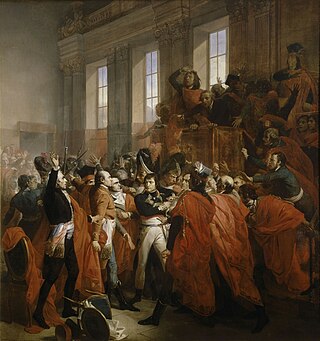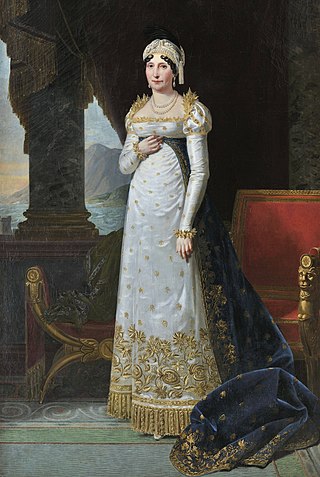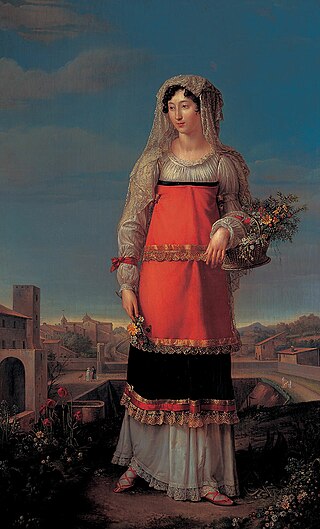
The House of Bonaparte is a former imperial and royal European dynasty of Corsican origin. It was founded in 1804 by Napoleon I, the son of Corsican nobleman Carlo Buonaparte and Letizia Buonaparte. Napoleon was a French military leader who rose to power during the French Revolution and who, in 1804, transformed the First French Republic into the First French Empire, five years after his coup d'état of November 1799. Napoleon and the Grande Armée had to fight against every major European power and dominated continental Europe through a series of military victories during the Napoleonic Wars. He installed members of his family on the thrones of client states, expanding the power of the dynasty.

Joseph-Napoléon Bonaparte was a French statesman, lawyer, diplomat and older brother of Napoleon Bonaparte. During the Napoleonic Wars, the latter made him King of Naples (1806–1808), and then King of Spain (1808–1813). After the fall of Napoleon, Joseph styled himself Comte de Survilliers and emigrated to the United States, where he settled near Bordentown, New Jersey, on an estate overlooking the Delaware River not far from Philadelphia.

Lucien Bonaparte, 1st Prince of Canino and Musignano, was a French politician and diplomat of the French Revolution and the Consulate. He served as Minister of the Interior from 1799 to 1800 and as the president of the Council of Five Hundred in 1799.

Napoleon III was the first president of France from 1848 to 1852, and the last monarch of France as Emperor of the French from 1852 until he was deposed in absentia on 4 September 1870.

Napoleon Bonaparte, later known by his regnal name Napoleon I, was a French emperor and military commander who rose to prominence during the French Revolution and led successful campaigns during the Revolutionary Wars. He was the leader of the French Republic as First Consul from 1799 to 1804, then of the French Empire as Emperor of the French from 1804 until 1814, and briefly again in 1815. His political and cultural legacy endures as a celebrated and controversial leader. He initiated many enduring reforms, but has been criticized for his authoritarian rule. He is considered one of the greatest military commanders in history and his wars and campaigns are still studied at military schools worldwide. However, historians still debate whether he was responsible for the Napoleonic Wars in which between three and six million people died.

The Concordat of 1801 was an agreement between Napoleon Bonaparte and Pope Pius VII, signed on 15 July 1801 in Paris. It remained in effect until 1905, except in Alsace-Lorraine, where it remains in force. It sought national reconciliation between revolutionaries and Catholics and solidified the Roman Catholic Church as the majority church of France, with most of its civil status restored. This resolved the hostility of devout French Catholics against the revolutionary state. It did not restore the vast Church lands and endowments that had been seized during the Revolution and sold off. Catholic clergy returned from exile, or from hiding, and resumed their traditional positions in their traditional churches. Very few parishes continued to employ the priests who had accepted the Civil Constitution of the Clergy of the revolutionary regime. While the Concordat restored much power to the papacy, the balance of church-state relations tilted firmly in Napoleon's favour. He selected the bishops and supervised church finances.

The Consulate was the top-level government of France from the fall of the Directory in the coup of 18 Brumaire on 10 November 1799 until the start of the Napoleonic Empire on 18 May 1804. By extension, the term The Consulate also refers to this period of French history.

Filippo Antonio Pasquale de' Paoli was a Corsican patriot, statesman, and military leader who was at the forefront of resistance movements against the Genoese and later French rule over the island. He became the President of the Executive Council of the General Diet of the People of Corsica and wrote the Constitution of the state.

The coup d'état of 18 Brumaire brought Napoleon Bonaparte to power as First Consul of France. In the view of most historians, it ended the French Revolution and led to the coronation of Napoleon as emperor. This bloodless coup d'état overthrew the Directory, replacing it with the French Consulate. This occurred on 9 November 1799, which was 18 Brumaire, Year VIII under the short-lived French Republican calendar system.

The Council of Five Hundred was the lower house of the legislature of France under the Constitution of the Year III. It existed from 31 October 1795 to 9 November 1799 during the Directory (Directoire) period of the French Revolution.

The Constitution of the Year VIII was a national constitution of France, adopted on 24 December 1799, which established the form of government known as the Consulate. The coup of 18 Brumaire had effectively given all power to Napoleon Bonaparte, and in the eyes of some, ended the French Revolution.

Bonapartism is the political ideology supervening from Napoleon Bonaparte and his followers and successors. The term was used to refer to people who hoped to restore the House of Bonaparte and its style of government. In this sense, a Bonapartiste was a person who either actively participated in or advocated for conservative, monarchist and imperial political factions in 19th-century France.

Paula Maria Bonaparte Leclerc Borghese, better known as Pauline Bonaparte, was an imperial French princess, the first sovereign Duchess of Guastalla, and the princess consort of Sulmona and Rossano. She was the sixth child of Letizia Ramolino and Carlo Buonaparte, Corsica's representative to the court of King Louis XVI of France. Her elder brother, Napoleon, was the first emperor of the French. She married Charles Leclerc, a French general, a union ended by his death in 1802.

Maria-Letizia Bonaparte, known as Letizia Bonaparte, was a Corsican noblewoman and the mother of Napoleon I of France. She received the title "Madame Mère" due to her status as the Emperor's mother.

A referendum concerning the establishment of the French Empire was held in France in June 1804. The result showed a virtually unanimous French electorate approving the change in Napoleon Bonaparte's status from First Consul to Emperor of the French, although the votes were most likely manipulated.

Presidential elections were held for the first time in France on 10 and 11 December 1848, electing the first and only president of the Second Republic. The election was held on 10 December 1848 and led to the victory of Louis-Napoléon Bonaparte with 74% of the popular vote. This was the only direct presidential election until the 1965 French presidential election. The six candidates in the election, in order of most votes received, are Louis-Napoléon Bonaparte of the Bonapartists, Louis Eugène Cavaignac of the moderate Republicans, Alexandre Auguste Ledru-Rollin of the Montagnards, François-Vincent Raspail of the Socialists, Alphonse de Lamartine of the Liberals, and Nicolas Changarnier of the Monarchists.

A referendum on re-establishing the Empire was held in France on 21 and 22 November 1852. Voters were asked whether they approved of the re-establishment of the Empire in the person of Louis Napoléon Bonaparte and family. It was approved by 96.9% of voters with a 79.8% turnout. As with other plebicites under Napoleon III, the result were rigged and only served to legitimize their rule under a false sense of democracy.

A referendum was held in France on 20 and 21 December 1851. Voters were asked whether they approved of the continuation of the authority of Louis Napoléon Bonaparte and to delegate the powers required to produce a new constitution. It was approved by 92% of voters with an 81.7% turnout.

The First French Empire, officially the French Republic, then the French Empire after 1809 and also known as Napoleonic France, was the empire ruled by Napoleon Bonaparte, who established French hegemony over much of continental Europe at the beginning of the 19th century. It lasted from 18 May 1804 to 3 May 1814 and again briefly from 20 March 1815 to 7 July 1815, when Napoleon was exiled to St. Helena.

Filistine Charlotte Bonaparte Gabrielli was a French Napoleonic princess and the eldest daughter of Lucien Bonaparte and Christine Boyer. She became princess Gabrielli following her marriage to Mario Gabrielli, prince of Prossedi and Roccasecca, Duke of Pisterzo. In Italy, she was known as Carlotta.
















